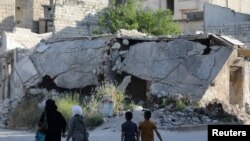Airstrikes on Syria's northwestern Idlib region stopped on Friday after the government announced it had agreed a truce following more than three months of deadly bombardment of the jihadist-held region.
But the Syrian Observatory for Human Rights war monitor also reported tit-for-tat artillery attacks by regime and opposition forces in the northwestern region that killed one civilian.
Most of Idlib province and parts of Hama, Aleppo and Latakia are controlled by Hayat Tahrir al-Sham, a jihadist group led by Syria's former al-Qaida affiliate.
The region is supposed to be protected from a massive government offensive by a Turkish-Russian deal struck in September in the Russian resort of Sochi.
But the deal has faltered and Syrian forces, along with Russia, have stepped up their bombardment there since the end of April.
On Thursday, a new ceasefire went into effect, as Syria peace talks resumed in Kazakhstan between rebel backer Turkey and regime allies Russia and Iran.
"A cautious calm has reigned since just before midnight (2100 GMT)," Rami Abdel Rahman, head of the Britain-based Observatory told AFP on Friday.
He said that Syrian and Russia aircraft were no longer seen flying over Idlib following the truce hailed by Moscow.
But regime forces and jihadists traded artillery fire despite the deal, the Observatory said.
Jihadists launched artillery attacks on the countrysides of Latakia and Hama provinces, while regime forces fired mortars on the north of Hama, it said.
A civilian was killed and three others wounded in jihadist rocket fire near Qardaha -- the ancestral village of President Bashar al-Assad -- in Latakia, state news Syrian agency SANA and the Observatory said.
Last air raids
An AFP correspondent reported that an early warning system known as Sentry registered the last air raids on the Idlib province town of Khan Sheikhun just two minutes before the truce took effect at midnight on Thursday.
The Sentry program uses human observers and a network of sensors to compute a predicted impact location when Syrian or allied warplanes take off.
SANA on Thursday said that the latest Idlib truce is conditional on the implementation of last year's Turkish-Russian deal to enforce a buffer zone encircling the region.
The September accord was never fully implemented as jihadists refused to withdraw from a planned buffer zone, prompting government forces to launch a deadly bombing campaign.
According to the Observatory, some 790 civilians have been killed by regime and Russian attacks in the area in the past three months, along with 1,000 jihadists and other rebels and 900 pro-government fighters.
The fighting has displaced more than 400,000 people, the U.N. says.
'Clever ploy'
Assad, who now controls around 60 percent of the country, has vowed to reclaim all of Syria, including Idlib, the last major jihadist bastion in Syria's northwest.
"I don't see the ceasefire lasting as Assad will not tolerate Idlib being outside his sphere of influence," said Syria researcher Samuel Ramani.
"But its a clever ploy likely instigated by Russia to bolster the credibility and perceived effectiveness of the Astana talks," he told AFP, referring to the peace talks taking place in Kazakhstan.
The head of the Syrian army's political bureau, Major General Hasan Hasan, said Thursday the armed forces would maintain the campaign in northern Syria if diplomatic efforts failed.
Syria expert Nawar Oliver said if anti-government groups in the region reject the truce Russia will continue "to bomb civilians and carry out massacres".
Or they could abide by the ceasefire, placing themselves at the mercy of Moscow "which has a track record violating agreements," Oliver told AFP.
The rebels don't "trust" Russia, he said.
The Syrian conflict has killed more than 370,000 people and driven millions from their homes since it started with the brutal repression of anti-government protests in 2011.





